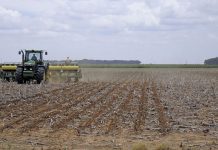
What is your professional background and what position do you hold at the DSA?
I’ve been an environmental health practitioner, with expertise in food safety management systems, for 25 years. This includes a period as assistant head of health services at the Springs City Council. In 2005, I started managing various statutory projects on behalf of the Dairy Standard Agency (DSA), an independent non-profit organisation that monitors and promotes dairy quality and safety for the industry and consumer.
READ:Twinning in cattle: benefits vs cost
How long has the DSA been in existence and why was it established?
It was created in 2002, when the organised dairy industry adopted a new strategic approach. Founder members included Milk SA, South African Milk Processors’ Organisation (Sampro) and the Milk Producers’ Organisation (MPO), supported by the South African National Consumer Union (SANCU).
We act independently of any commercial interests and our board consists of members who have no interests in any enterprises in the primary or secondary dairy industry. Current membership includes the organisations I’ve mentioned plus the South African Society of Dairy Technology (SASDT).
What are DSA’s primary goals?
They include monitoring milk and other dairy products, communicating with the industry and other stakeholders, and providing support services. We also liaise with government regulators and other organisations that monitor the standards of dairy products for consumer consumption, for compliance with legal standards. This includes a remedial action programme for those who contravene regulations. We currently manage 17 statutory and non-statutory projects.
How is the DSA funded?
Our projects are funded through Milk SA’s levy income, in terms of the Marketing of Agricultural Products Act. Non-statutory projects are funded on a user-pays basis.
Where does the DSA operate and how many staff are there?
DSA operates in all nine provinces. The head office is in Centurion and we have an office in Cape Town that serves the Western Cape and Eastern Cape. The agency is a small organisation with only seven staff members, but we also have external contractors that execute projects on our behalf. Non-core functions such as financial services are outsourced. DSA personnel are industry experts, but they don’t conduct inspections – that’s the function of law enforcement officers. As a self-regulatory initiative, DSA operates in close collaboration with various municipal health officials, the department of agriculture, and the Department of Trade and Industry’s National Regulator for Compulsory Specifications.
What monitoring does the DSA undertake?
We monitor all categories of milk destined for consumers, whether raw or heat-treated, as well as condensed and evaporated milk, cream, cheese, and fermented dairy products such as yoghurt and maas, in collaboration with health authorities. This is followed up by personal contact with processors whose monitoring results indicate non-compliance.
The DSA also provides support to various government department officials to encourage them to participate in the DSA monitoring programme. In addition, we monitor and investigate complaints about milk and other dairy products on behalf of the retail industry.
Must dairy industry value chain stakeholders be members of the DSA to be subjected to monitoring?
No. DSA monitors all milk and dairy products sold to consumers. The agency does, however, have clients for which it undertakes specific monitoring on a contract basis, according to the user-pays principle.
Who are the DSA’s public and private sector partners, and why these bodies in particular?
The DSA is recognised by government bodies, the organised primary and secondary dairy industry, and other stakeholders such as national consumer bodies and the retail sector. We’ve developed strong relationships with the department of health, municipal health authorities, the department of agriculture, the National Consumer Commission, Milk SA, Sampro, MPO and SASDT.
How would you rate the level of compliance to legislation and standards in the dairy value chain?
Although most dairy products perform satisfactorily, the DSA has a major concern with the packed unpasteurised and the retail bulk pasteurised and unpasteurised milk categories. These regularly record negative compliance rates. This is mainly due to poor control measures and the illegal sale of sub-standard milk to the end-user. DSA is in frequent contact with the relevant law enforcement bodies, and provides support with technical dairy information, workshops and guidance documents.
What are the major concerns with compliance?
The dairy industry, as with most other food industry sectors, increasingly faces the challenges of a demanding food safety environment. This includes dealing with issues such as public criticism and significant risks relating to animal welfare, biosecurity, environmental management, biotechnology and food safety. Food safety in the dairy industry is based on the farm to fork principle.
Therefore, it’s important that stakeholders remain aware of potential risks and take the necessary precautions to minimise any harmful factors that could affect the industry and the consumer. Substandard raw milk invariably comes from substandard and poorly managed milk production facilities, and the same applies to the processing, manufacturing and packaging sectors.
Substandard products that reach the retail sector can cause extensive and long-term harm to both the industry and consumers. Therefore commitment to food safety management is non-negotiable at milk production, processing and manufacturing levels. The dairy industry as a whole will not be appreciative of a company if it fails to adequately protect the supply chain. Liability is sure to follow.
As there was not much scientific research available years ago, companies may not have realised that their products were making consumers ill and therefore would not have initiated a recall. Today, there is a greater likelihood that outbreaks of foodborne illness will be traced back to the supplier of the contaminated product. In the current business environment, manufacturers must have solid data available that indicates clear cut-off dates. Without this, shelf life will be used to determine the scope of the recall.
In future, recalls will not only be about linking actual illnesses to culprit products, they will have to do with the way in which preventive measures are implemented. Assessing whether products are contaminated and require recalling will also include an investigation of the overall implementation of food safety practices in the processing or manufacturing facility.
Companies may increasingly be required to recall products if regulators determine that the company’s products were manufactured in unsanitary conditions, are in breach of food regulations, and have been produced in a way that creates the potential for contamination, even if there’s no evidence in the end-product itself. Another concern is the deliberate mislabelling of dairy products.
Although these issues are addressed on an ongoing basis, it should remain a strong focus point, specifically with regard to illegally imported dairy products that do not comply with South African standards and then end up in the retail sector.
How does the DSA get non-compliant stakeholders to adhere to the relevant legislation and standards?
About 500 samples of various food products are tested by independent laboratories on a quarterly basis. This is done in co-operation with metropolitan, district- and local municipal health authorities. Serious food safety, product composition, and metrology non-conformance issues are then dealt with at managerial level, so that remedial action can be instituted.
Non-conforming products that are identified need to be followed up effectively to ensure that appropriate action is taken by the processors and/or distributors. Follow-up communication with processors/distributors, and where applicable, the retail outlet, are dealt with separately. During follow-up visits, technical dairy information is shared and assistance provided with regard to facility and product food safety assessments. Where necessary, follow-up samples are taken and analysed to confirm compliance.
DSA also conducts special investigations outside the normal scope of its monitoring activities, often leading to more intensive collaboration with the various authorities.
Can the DSA determine and administer penalties against non-compliant stakeholders?
The DSA is not empowered to determine and administer penalties, but relies heavily on its relationship with authorities to ensure that appropriate action is taken against offenders.
What are the penalties for non-compliant stakeholders?
Some of the actions that can be taken include prohibiting trade, as well as seizing and destroying goods. In the case of a conviction, any person found guilty could be sentenced to a fine and/or term of imprisonment as determined by the court.
What does the future hold for the dairy industry value chain in terms of compliance with legislation and standards?
Compliance is already complicated, because the law is fragmented, and to some degree, outdated. In addition to a range of industry- specific requirements set by downstream and upstream stakeholders, a range of mandatory and non-mandatory standards set by the SABS, Codex Standards, ISO, and International Dairy Federation guidelines have to be adopted.
A wide range of voluntary criteria also regulates the dairy value chain.
The key issue here is that as much as possible needs to be done to consolidate national legislation through effective inter- and intra-governmental liaison, as well as aligning national legislation with international law to facilitate national and international trade.
Regulation should not inhibit development, but rather stimulate safe food production. Public concern about food safety is also placing increasing pressure on government and stakeholders to become more prescriptive and proactive with food safety regulations and control measures.
However, given the scarcity of public sector resources, and concerns about the impact of regulation on competitiveness, it is imperative for the industry not to lose focus. Management can no longer delegate the responsibility for food safety. Comprehensive understanding of all relevant legislation is crucial at the highest level.
Phone Jompie Burger on 012 665 4250 or email [email protected].
This article was originally published in the 13 February 2015 issue of Farmer’s Weekly.













